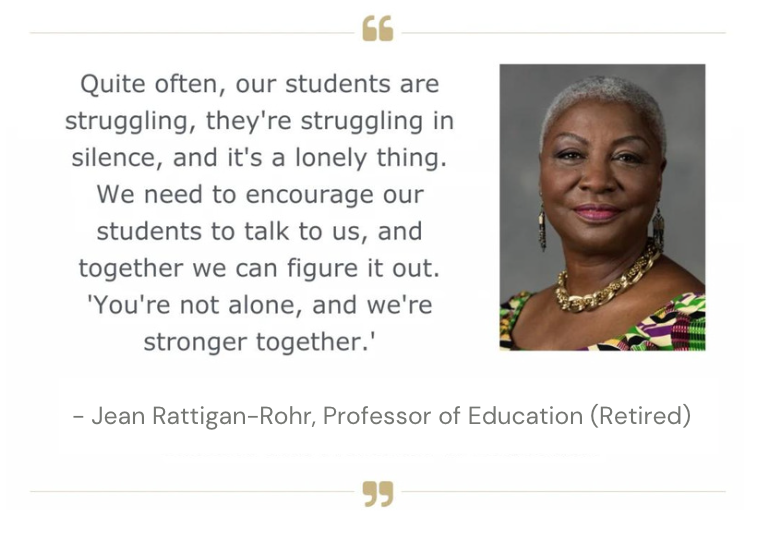- Home
- Center for the Advancement of Teaching & Learning
- Supporting Student Mental Wellness in Our Faculty Roles
Supporting Student Mental Wellness in Our Faculty Roles
Statistics on college student mental health can seem alarming: In the 2018-2019 Healthy Minds Study, 42% of college students reported thoughts of self-harm or symptoms of a mental health problem (Eisenberg et al., 2019). These statistics represent the continuation of a long-term trend of steady growth in rates of anxiety, depression, and social anxiety, along with other mental health concerns (Center for Collegiate Mental Health, 2018). Ultimately, only 40% of college students were categorized as being in a state of positive mental health (Eisenberg et al., 2019).

Traditionally, mental wellness may have seemed outside the bounds of faculty professional relationships with students. However, learning and mental wellness are inextricably intertwined. Basic cognitive capacities such as memory and concentration, as well as the problem-solving ability we hope students will develop through challenging coursework, may be diminished by high levels of stress, anxiety, and depression (Schwabe & Wolf, 2010; Burt et al., 1995; Kertzman et al., 2010; Arnsten, 2009; Luisi Rodrigues et al., 2019). A staggering 77% of students reported that their academic performance was impaired by emotional or mental health problems on at least one day in the prior 4 weeks (Eisenberg et al., 2019; Abelson, 2019). Ultimately, our relatively long-term relationships and frequent interactions with students leave us uniquely well-placed to help them develop the habits and dispositions to sustain mental well-being and guide them to seek help to recover it when lost.
The university’s Act-Belong-Commit initiative for mental wellness provides a framework to consider specific evidence-based practices that we can embed in our teaching, academic advising, and mentoring roles that will support students’ mental well-being over time. Additionally, training students in skills and dispositions that help them manage the pressures of coursework and life can have a tremendous impact. A sampling of these strategies is introduced in the “Sustain” section below.
Faculty also play a critical role for students experiencing a mental health crisis. Currently, 45% of college students with mental health problems are not receiving treatment, in part because a similar percentage (47%) believed that others would think less of them for doing so (Eisenberg et al., 2019). While most of us are not trained as mental health professionals, students reach out to faculty for informal support more often than to any other adult figure (Eisenberg et al., 2019). Ideas for planning to support students in crisis (starting even before the crisis begins) are discussed in the “Help” section below.
Finally, while faculty play an important role in student mental health, we cannot and should not support students in all the ways they need. Instead, by learning about resources available at Elon and understanding the expertise of our colleagues, we prepare ourselves to connect students in need with others who can help them recover from crisis and build a holistic support system. Relevant Elon resources are collected under the “Connect” section below.
 However, knowing that these practices also impact students’ mental wellness allows us to intentionally deploy them to serve that purpose as well.
However, knowing that these practices also impact students’ mental wellness allows us to intentionally deploy them to serve that purpose as well. f – a brag about themselves. These are related to academics, research, the life of the mind. I share as well. This focuses us on what we are accomplishing and achieving, rather than the hurdles we might encounter. It also helps us cheer for everyone else as we support them along the way – usually with applause.
f – a brag about themselves. These are related to academics, research, the life of the mind. I share as well. This focuses us on what we are accomplishing and achieving, rather than the hurdles we might encounter. It also helps us cheer for everyone else as we support them along the way – usually with applause. them to think of themselves as a whole person. My hope is that this will help them to make intentional choices that support their overall success and well-being as they chart their college career and beyond, with a focus not only on grade success but also on healthy and mindful living.
them to think of themselves as a whole person. My hope is that this will help them to make intentional choices that support their overall success and well-being as they chart their college career and beyond, with a focus not only on grade success but also on healthy and mindful living. relationships. On a syllabus, you might craft a mental health statement and include on-campus resources, both empowering with the knowledge to support themselves and one another and signaling that you care. In one-on-one conversations, you might keep resource materials for related campus services in plain view and ask advisees or mentees whether they’d like a copy to have on hand to support a friend in need. In both contexts, normalize and destigmatize challenge by occasionally sharing your own stories of struggle, failure, and resilience.
relationships. On a syllabus, you might craft a mental health statement and include on-campus resources, both empowering with the knowledge to support themselves and one another and signaling that you care. In one-on-one conversations, you might keep resource materials for related campus services in plain view and ask advisees or mentees whether they’d like a copy to have on hand to support a friend in need. In both contexts, normalize and destigmatize challenge by occasionally sharing your own stories of struggle, failure, and resilience.